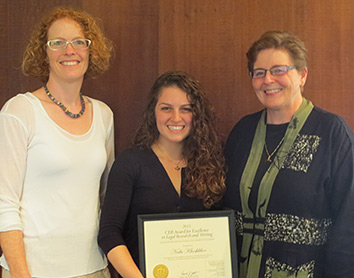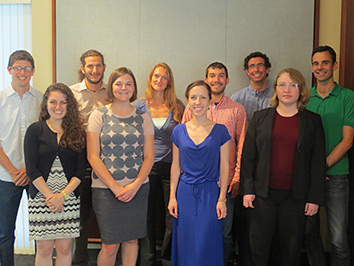By Andrew Cohen

Gillian Lester and CEB Executive Director Pam Jester.
Neda Khoshkhoo ’15 has won the sixth annual Continuing Education of the Bar (CEB) Award for Excellence in Legal Research and Writing at Berkeley Law. At a luncheon ceremony in September, CEB Executive Director Pam Jester presented Khoshkoo with a framed certificate and a $2,500 check.
CEB is a joint committee of the University of the California and the State Bar of California that provides practice guides, continuing education, and other professional resources to state bar members. It established the award to honor Berkeley Law students who demonstrate outstanding performance in the First Year Skills Program.
Khoshkhoo and 11 classmates became eligible for the award last spring after receiving Best Brief honors in their first-year Written and Oral Advocacy (WOA) sections. The other Best Brief winners were Bita Assad, Alexx Campbell, John Chamberlain, Andy Coghlan, Michael Gaffney, Sonja Good-Stefani, Judah Lakin, Samantha Reed, Alexandra Rubow, Ari van Schilfgaarde, and Bonnie Watson.
“Although the prospect of writing a brief can be overwhelming for any first-year law student,” Khoshkhoo said, “our professors and teaching assistants provided us with invaluable instruction and support throughout the process.”
At the award luncheon, First-Year Skills Program Director Lindsay Sturges Saffouri introduced the Best Brief winners, and Director of Professional Skills David Oppenheimer spoke about the importance of legal writing. One of the three judges who reviewed the final briefs, WilmerHale senior associate Niki Moore ’06, noted the outstanding quality of legal analysis and writing.
On the case
Like all first-year students at Berkeley Law, Khoshkhoo first completed the Legal Research and Writing class during her fall semester. The class teaches students how to read cases, research legal problems, choose precedent, and write legal memoranda on topics involving state and federal law.

Khoshkhoo, Samantha Reed, Lexi Rubow, Bonnie
Watson. Back row (left to right): Alexx Campbell,
Judah Lakin, Sonja Good-Stefani, Ari van
Schilfgaarde,
Michael Gaffney, Andrew Coghlan.
Not pictured: Bita Assad and John Chamberlain.
During the spring WOA course, students study more advanced research techniques and learn how to write a brief. After receiving a hypothetical case based on an emerging federal issue, students research the case law and submit competitive briefs; finalists revise their briefs based on professor feedback and argue their position in a moot court setting. Saffouri was Khoshkhoo’s professor in both of her first-year skills courses.
“Neda was an excellent student all year, but her flair for writing really came through in her brief,” Saffouri said. “What impressed me most was her ability to argue a position with which I know she personally disagreed. She stepped into the role of the defense lawyer and wrote a brief that was well-researched, persuasively argued, and showed respect for all parties involved.”
This year’s case addressed whether a department store’s termination of an employee self-identified as a transgender person violated Title VII of the Civil Rights Act of 1964. Khoshkhoo wrote a brief on behalf of the department store, opposing the employee’s motion for partial summary judgment.
“The amount of detailed, individualized feedback the instructors give to each student exemplifies Berkeley Law’s dedication to skills-based learning,” Khoshkhoo said. “I’m honored to participate in CEB’s efforts to support our school’s legal research and writing curriculum.”
The CEB Award selection committee included Niki Moore, Judge John Sugiyama ’75 of the Contra Costa County Superior Court, and Clara Ruyan Martin of Cadence Law Group in Los Angeles.